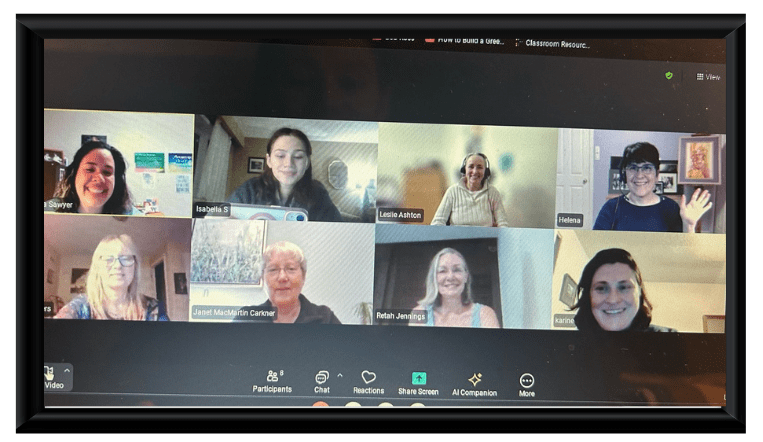Weekly Word Challenge – Ochenta y noventa
Welcome back! The sun is out, the snow is melting and I see everyone smiling! WAHOOOO!
Gracias a Laura for forwarding the Globe & Mail article about “The most valuable thing I learned in Spanish class had nothing to do with learning Spanish” It’s exactly what I love to tell my students – come to class and jump in with both feet! We are all here to help each other out. Have a read and let me know what you think!
Going back to the last week’s words and challenge, do you remember what they were? Find out the answers below.
Corazón: Heart
Tomate: Tomato
Here are the fantastic responses that came in. I love the creativity! YOUPPI!
Mi corazón se llena cuando tengo tomates en mi jardín.
My heart is filled when I have tomatoes in my garden.
Me gusta cortar mi tomate en forma de corazón para mi ensalada.
I like to cut my tomato into a heart shape for my salad.
Mi corazón se siente feliz cuando como tomates.
My heart feels happy when I eat tomatoes.
La mayoría de las personas saben que los tomates son una fruta no vegetable, pero también son buenos para el corazón. Lo busqué en Google, por lo que debe ser cierto.
Most people know tomatoes are a fruit not a vegetable, but are also good for your heart. I googled it, so it must be true.
Here are the words for this week!
I would like to challenge those who are thinking about responding to please respond….just try!
Por favor!! Por favor!

Are you curious about “Canadians Speak Spanish”?
A wonderful opportunity to speak (hablar) and practice in Spanish. The students have a great time speaking with others and meeting new people. We have guests who are hispanics too!
The March session was AMAZING!!!! We were 8 in total and we all had a lot of opportunities to speak in español! YOUPPI!!
Do you have friends who speak Spanish and want to join? Please tell them about this community class! The next session will be Tuesday April 1st.

Photo from the March class.
Read article from the Globe & Mail below:
The most valuable thing I learned in Spanish class had nothing to do with the language.
?Estáis listos?
That is our Spanish teacher’s opening question on our first day of night school. Silence. We meet his question with blank looks and sheepish faces. Mercifully, he repeats his question and this time, he translates into English (Are you ready?). Relieved, we all smile and nod a compliant yes. Si, estamos listos (We are ready). Ready to take the plunge.
The guy sitting next to me, a bartender, is clearly ready to get things off to a roaring start when the teacher asks him to describe himself. “Estoy enamorado,” he says, I am in love. Everyone cracks up and we all relax a bit. Someone else says, “Estoy cansada” (I am tired). Another student pipes up, “Estoy nervioso” (I am nervous).
Well, I am intimidated. I keep hoping the teacher won’t ask me anything because I have no vocabulary and translation apps are strictly forbidden in the classroom. I start to wonder if beginner Spanish is the right level for me.
Like many people during COVID-19, I spent far too much time cloistered at home, where I also worked. And when restrictions ended, I couldn’t get out of the house fast enough. Dance classes, yoga classes, language classes, I was up for anything and was looking forward to being in the physical presence of real people again. I decided to start with Spanish classes. How hard could it be? I speak French fluently, I know German, studied Latin and can make do in Italian. Languages have always been my strength and my passion. Spanish being a Romance language, so similar to French and Italian, I figured it would be a breeze.
During the first six weeks of class, I cram tons of new words into my brain, memorize the main verb tenses, fill my notebooks with colloquial expressions (?Qué onda? What’s happening?), drill myself on irregular verbs and discover some similarities between my new language and those I speak already. I also learn some cool new things, unique to Spanish, that don’t exist in English and French. Who knew there could be two verbs for “to be”? To be Canadian, or to be an engineer, is not like being bored or being happy in Spanish. This existential distinction requires two different verbs. How amazing is that? I love the mechanics of learning as well as the nuances of Spanish and feel proud that I can absorb so much new material. But then something totally unexpected happens.
Three years later, I am enrolled in Intermediate Spanish Conversation class. No more memory work, no more grammar, no more repetitive drills. I have seriously upped the ante and decide it is time to stretch myself. Grammar classes are generally pretty safe, emotionally speaking. You answer a question and it is either right or wrong. There is no real skin in the game. On the other hand, conversation classes commit you to engaging with other people in a way that sounds unrehearsed. For perfectionists like me, this kind of spontaneity is a risky proposition.
“?Estás lista, Martha?” As homework for the second conversation class, we are to give a short presentation about a book we’ve read and then answer questions off the cuff. No problem. I’ve given many presentations. I’m good at thinking on my feet. I decide to do my prep, make a few notes and then ad lib. So cocky.
I chose to speak about Cher’s new memoir. With notes at hand, and a few bullet points, everything starts off really well. But during the question-and-answer part, the wheels start to fall off. My presentation becomes a lot less polished and much more random. I scramble to find the right words, draw a complete blank on which verb tenses to use. My linguistic wires get crossed, and I start using French instead of Spanish (the guy from Montreal smiles and gives a sympathetic nod). I revert to short sentences, look for work-arounds to express simple ideas that have suddenly become far too complex for my limited linguistic resources. Anxiety and vulnerability set in, as I realize I sound like an incoherent two-year old.
But then something magical happens. I decided not to try so hard. I ask for help (a career-ending move in my former corporate life where I was paid to be an expert). My classmates graciously chime in with the words I can’t find. The teacher asks a question that smooths over the rough edges and gets me back on track. I take a deep breath and realize that even though it’s not perfect, no one really cares. Everyone is eager to coach me along. I am actually enjoying this roller-coaster ride.
When I first signed up for Spanish classes, I thought it would be a purely intellectual pursuit. I have come to see that it is more like an improv class. You have to be ready to look foolish and have fun. You have to be ready to be creative: If you can’t find the perfect word, there are others that can work just as well. You have to be ready to acknowledge that it’s more important to connect with people than it is to have all the answers. Knowing this, am I ready to take the plunge again next semester? “Si, estoy lista.”
Martha Lynch lives in Toronto.
